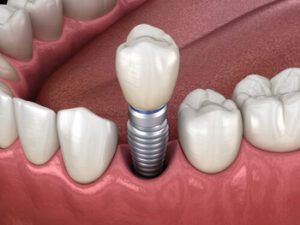Maintaining our health, including dental health, becomes increasingly important as we age. Restoring their smile with dental implants can be exciting and daunting for pensioners who may have experienced tooth loss over the years. But here’s the thing: dental implants offer more than just an aesthetic upgrade. They’re a transformative dental treatment that can significantly improve quality of life, oral health, and overall well-being.
Dental implants provide improved functionality, comfort, and lasting aesthetic appeal, making them a viable solution for missing teeth. In this article, we’ll dive into the world of dental implants for pensioners, exploring the process of dental implant surgery, the benefits, and everything you need to know to make an informed decision.
Why Consider Dental Implants? It’s More Than Just a Pretty Smile

For pensioners, dental implants represent a chance to regain what’s been lost over time—whether a single tooth or multiple teeth. Being able to chew comfortably, speak confidently, and smile freely can significantly enhance everyday life.
The Journey Begins: Understanding the Dental Implant Process
The journey to a new smile begins with understanding dental implant treatment. This isn’t just a one-step procedure; it’s a series of carefully planned stages that ensure the best possible outcome.
Initial Consultation: Setting the Stage
Your journey begins with a consultation with an appropriately qualified health practitioner. During this visit, your dental professional will evaluate your oral health, discuss your needs, and assess if you are an eligible candidate for dental implants. This assessment will likely include a dental examination, X-rays, and perhaps a 3D scan to get a detailed look at your jawbone health and surrounding teeth.
Planning and Preparation: The Blueprint for Success
Once it’s confirmed that dental implants are a suitable option, the planning phase for dental implant placement begins. This stage is crucial as it involves detailed implant placement planning, considering factors like bone density, the position of surrounding natural teeth, and the number of implants needed. If you’ve experienced significant bone loss, bone grafting might be necessary to ensure a strong implant foundation.
Surgical Procedure: The Heart of the Implant Journey
Dental implant surgery is a surgical or invasive procedure in which the implant, a small titanium post, is placed into the jawbone. This post serves as an artificial root for the prosthetic tooth that will eventually be placed on top. The surgery is typically performed under local anaesthesia, ensuring you remain comfortable throughout.
Healing and Osseointegration: Patience Is Key
Once the implant is placed, the healing process, called osseointegration, begins. During this time, the implant gradually fuses with the jawbone, establishing a solid and stable foundation for the artificial tooth. This crucial process can take several months, and your dentist will closely monitor your progress throughout to ensure everything is healing correctly.
Abutment Placement: Preparing for the Final Touch
An abutment is attached after the implant has fully blended with the jawbone. This small connector piece sits on top of the implant and works as the anchor for the prosthetic tooth or crown. The abutment placement is a minor procedure, typically performed under local anaesthesia.
Final Restoration: Your New Smile Revealed
Finally, after months of preparation and healing, the prosthetic tooth—a custom-made crown designed to match your natural teeth—is attached to the abutment. This is the moment where all the planning and waiting pays off. Your new tooth is not just functional; it’s designed to blend seamlessly with your neighbouring natural teeth, restoring both function and aesthetics.
The Benefits of Dental Implants: More Than Just a Cosmetic Fix
Dental implant treatment provides numerous benefits, particularly for pensioners. Beyond the obvious aesthetic improvements, dental implants offer functional, psychological, and health-related advantages.
Restoring Oral Health and Functionality

Dental implants also allow you to chew and speak more effectively. Unlike dentures, which can slip or cause discomfort, implants provide a stable, secure solution that mimics the function of natural teeth.
Preserving Facial Structure
Losing a tooth affects more than just your smile; it can also alter your facial structure. When teeth are lost, the jawbone shrinks, causing the face to appear sunken. Dental implants help maintain the jawbone and preserve your facial structure, helping you retain a youthful look.
Improving Quality of Life
The impact of dental implants on quality of life cannot be overstated. The confidence that comes with a complete, functional smile can enhance your social interactions, improve your diet by allowing you to eat a wider variety of foods, and even boost your overall health.
The Cost of Dental Implants: What to Expect
One of the most common concerns for pensioners considering dental implants is the dental implant cost. It’s no secret that dental implant procedures can be expensive, and for those on a fixed income, this can be a significant hurdle.
Understanding the Costs Involved
The cost of dental implants varies depending on several factors, including the number of implants needed, the procedure’s complexity, and whether additional treatments like bone grafting are required. The starting price for a single dental implant in Australia is around 3,000 AUD, but this can increase depending on the specific circumstances.
Low-Cost Dental Implants: Are They a Good Option?
While the idea of low-cost dental implants may be tempting, it’s important to approach them cautiously. Cheaper options may involve shortcuts in materials or techniques, which can lead to implant failure or other complications down the line. Choosing an appropriately qualified health practitioner who uses high-quality materials and adheres to best practices is essential.
Private Health Insurance and Dental Implants
If you have private health insurance, it’s worth checking whether your policy covers dental implants. Some policies may cover some of the costs, particularly if the implants are deemed necessary for maintaining oral health. However, coverage varies widely, so reviewing your policy and discussing your options with your insurer is essential.
Risks and Considerations: What You Need to Know
As in any surgical procedure, dental implant surgery comes with risks. An invasive procedure carries risks, including the possibility of implant failure, so it’s important to be aware of these risks and to discuss them with your dental professional before proceeding.
Common Risks Associated with Dental Implants
Common risks include infection, nerve damage, and implant failure. While these complications are rare, they can occur, particularly if an experienced dentist does not perform the procedure. Following all post-operative care instructions is crucial to minimise the risk of complications.
Implant Failure: What Happens If It Doesn’t Work?
Implant failure, while uncommon, can occur if the implant doesn’t properly integrate with the jawbone. In some cases, this may require the implant to be removed and replaced. Factors that may lead to implant failure include smoking, inadequate oral hygiene, and underlying health conditions that hinder bone healing.
Maintenance and Care: Keeping Your Implants in Optimal Shape
Once your dental implants are in place, maintaining them is crucial to ensuring their longevity. Proper care and routine dental check-ups are essential to keeping your implants and overall oral health in top condition.
Good Oral Hygiene: The Foundation of Implant Success
Maintaining good oral hygiene is mandatory for the upkeep of dental implants. Brushing and flossing regularly, along with rinsing with an antiseptic mouthwash can aid in preventing gum disease and other issues that could compromise your implants.
Regular Dental Check-Ups: Keeping an Eye on Your Implants
Routine dental check-ups are crucial for keeping an eye on the health of your implants and the surrounding teeth. During these visits, your dentist will search for any signs of possible complications, such as gum disease or bone loss, and address any concerns early on to prevent them from escalating.
Myths About Dental Implants for Seniors
There are several myths about dental implants for seniors that might deter some from considering this beneficial treatment. Let’s debunk some of these misconceptions and provide clarity on why implants can be an excellent choice for older adults.
“I’m Too Old for Dental Implants”
One of the most common myths is that dental implants are only for younger people. In reality, age is not a barrier to getting dental implants. They can be a valid option for individuals of any age as long as they are in good overall oral health and have sufficient jawbone density. Many seniors successfully undergo implant procedures and enjoy the benefits for years to come.
“Dental Implants Are Painful”
While dental implant surgery is an invasive procedure, advancements in pain management and sedation options have made it relatively comfortable. Most patients report only minor discomfort during and after the procedure, similar to what you might feel after a tooth extraction. Your dentist will give you pain relief options and post-surgery care instructions to promote a smooth recovery.
“Implants Can’t Be Done if I Have Gum Disease”
While active gum disease needs to be treated before proceeding with implants, having a history of gum disease does not automatically disqualify you from getting dental implants. Your dentist will evaluate your oral health and may recommend treatments to address any existing gum issues before implant placement.
Navigating Payment Options for Dental Implants
Dental implants can substantially enhance your oral health and overall quality of life, but they are often a considerable financial investment. For many pensioners, the dental implants cost might seem daunting at first. However, several payment options are available to help make this transformative dental treatment more accessible and affordable. Let’s explore some common ways to finance dental implants, ensuring you can receive the care you need without breaking the bank.
EFTPOS and Credit Cards
Most dental clinics accept EFTPOS and all major credit cards, providing a straightforward and immediate way to pay for your dental treatments. This option allows you to use your existing credit or debit cards to cover the expense of your dental implants without the need for additional financing.
Health Fund Rebates through HICAPS
If you have private health insurance, you can take advantage of health fund rebates through HICAPS. This system enables you to instantly claim your health fund benefits, immediately lowering your out-of-pocket costs. Major health funds like MBF, Medibank Private, HCF, and others are typically accepted, making it easier for you to access dental care without a significant upfront cost.
Interest-Free Payment Plans
For those who wish to distribute the cost of their dental implants over a longer period, interest-free payment plans are an excellent option. Clinics often partner with providers like humm, Afterpay, and DentiCare to offer these plans, which allow you to pay for your dental treatment in instalments without accruing any interest. This makes it easier to manage your finances while getting the dental care you need.
Flexible Financing Options
Interest-free payment plans through providers like Humm, Afterpay, and DentiCare offer flexible financing options tailored to your budget. You can choose from a wide range of repayment terms, allowing you to select a plan that aligns with your financial situation. These plans often require no deposit, enabling you to start your dental implant journey without an upfront payment.
Making Dental Implants Affordable and Accessible

Before beginning your dental implant treatment, it’s a good idea to discuss these payment options with your dental clinic. They can help you throughout the process, helping you select the best option for your situation and ensuring you receive the necessary care without financial pressure.
Conclusion: Dental Implants—A Wise Investment in Your Health and Happiness
Dental implants offer more than just a way to address tooth loss; they are a commitment to maintaining your oral health, overall health, and quality of life. By choosing to access dental implants, you’re opting for a durable, long-term solution that can replace missing teeth, restore your smile, and boost your confidence.
For pensioners considering dental implants, it’s crucial to weigh the benefits, costs, and potential risks, and to consult with a skilled dental professional to explore your options. Whether you access dental implants or choose another form of tooth replacement, the goal is to find a solution that best suits your needs, health status, and lifestyle.
Investing in your dental health is always worthwhile. With the right care and guidance, dental implants can offer a lifetime of benefits, making them a wonderful choice for seniors who want to enhance their oral health and enjoy their golden years with a beautiful, fully functional smile.
If you’re interested in learning more or discussing your options, contact Port Macquarie Dental Centre at (02) 6105 9853.
Note: Any surgical or invasive procedure carries risks. Before proceeding, you should seek a second opinion from an appropriately qualified health practitioner.
References:
Mayo Clinic. (n.d.). Dental implant surgery. https://www.mayoclinic.org/tests-procedures/dental-implant-surgery/about/pac-20384622
Humm. (n.d.). National dental plan. https://www.shophumm.com/au/store/national-dental-plan/
Colgate. (n.d.). Dental implants cost explained. https://www.colgate.com.au/oral-health/implants/dental-implants-cost-explained-0415
ScienceDirect. (n.d.). Osseointegration. https://www.sciencedirect.com/topics/medicine-and-dentistry/osseointegration#:~:text=Osseointegration%2C%20defined%20as%20a%20direct,success%20of%20endosseous%20dental%20implants.
British Dental Journal. (2012). Article on dental topics. https://www.nature.com/articles/sj.bdj.2012.1090
Healthline. (n.d.). Sunken cheeks: Causes and treatments. https://www.healthline.com/health/sunken-cheeks#:~:text=Sunken%20cheeks%20occur%20when%20you,you%20to%20lose%20facial%20fat.
National Institute of Dental and Craniofacial Research. (n.d.). Oral hygiene. https://www.nidcr.nih.gov/health-info/oral-hygiene

